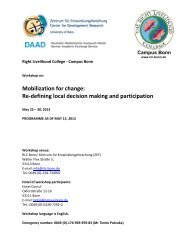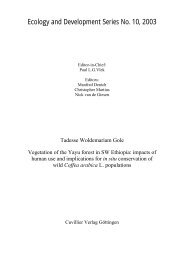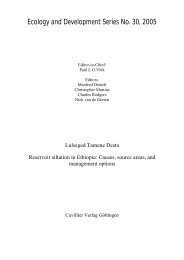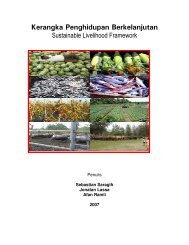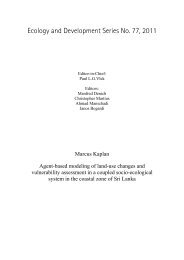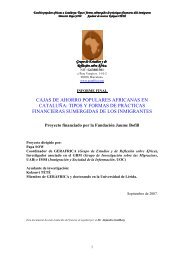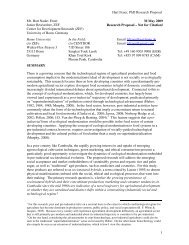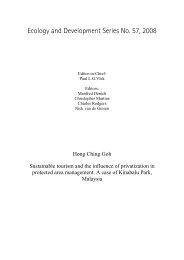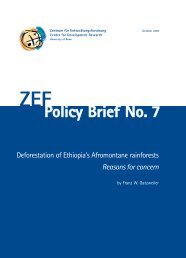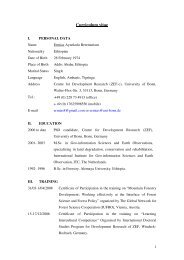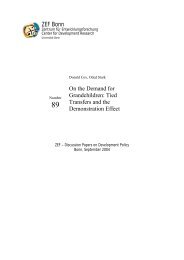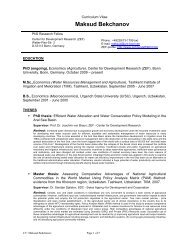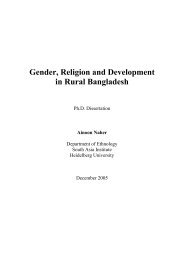ZEF Bonn
ZEF Bonn
ZEF Bonn
You also want an ePaper? Increase the reach of your titles
YUMPU automatically turns print PDFs into web optimized ePapers that Google loves.
52<br />
<strong>ZEF</strong> <strong>Bonn</strong> ● Center for Development Research – Annual Report 2001/2002<br />
GLOWA-Volta project<br />
It has been argued that local<br />
communities are better suited<br />
than national governments to<br />
manage local natural resources.<br />
<strong>ZEF</strong> has set up a research<br />
group aiming at a better<br />
understanding of the factors<br />
leading to the success or failure<br />
of such approaches.<br />
fallow systems in the Eastern Amazon. The evaluation includes a private and social<br />
cost benefit analysis, a bio-economic modelling approach to quantify land use decisions<br />
under different policy scenarios, an analysis of institutions relevant to technology<br />
diffusion and a comparative analysis to assess the significance of the results for<br />
other areas in the Amazon.<br />
2.3.2 Water safety and security issues<br />
Changes in water supply and demand in the Volta basin as well as the hydrological<br />
and socio-economic trade-offs in water allocation are being examined in the context<br />
of the GLOWA-Volta project. Based on ten-year average data and an institutional<br />
analysis of the water sector, alternative water management<br />
scenarios have been developed and assessed in initial runs<br />
of an integrated economic-hydrologic optimisation model.<br />
Initial results suggest that the effect of increased irrigation<br />
development is small compared to rainfall and runoff variability<br />
in the Volta basin. Secondary data analysis showed that only<br />
around 40 % of rural households and about 50 % of urban<br />
households use improved water sources for their drinking water<br />
needs. A household's choice between improved and traditional<br />
drinking water sources not only depends on the household's<br />
income level and distance to the source but is also determined<br />
by other factors such as education, preferences or taste.<br />
Mapping of water-related diseases, moreover, underlines the<br />
importance of health effects through water use.<br />
A PhD research project was finalised in 2001 looking at the “Economics of<br />
Household Water Security in Jordan". The objective of this research was a better<br />
understanding of household access, demand and usage of water over space and time<br />
and the assessment of effective water prices paid by poor households. This research<br />
forms a pilot study of <strong>ZEF</strong> research on Water and Poverty, which will be continued<br />
and extended within the GLOWA-Volta framework.<br />
2.3.3 Sustainable land use in Uganda<br />
A <strong>ZEF</strong> project conducted in co-operation with the International Food Policy<br />
Research Institute (IFPRI) integrates biophysical and socio-economic approaches to<br />
identify suitable incentives for enhancing sustainable land use in Uganda.<br />
Bioeconomic modelling work within a multiple-agent framework is being conducted<br />
at two sites representing different development pathways: one site in the coffeebanana-maize<br />
system of central Uganda, and the other in the maize-dominated<br />
system in the highlands of eastern Uganda.<br />
2.3.4 Institutions and natural resource management<br />
Many developing countries are currently devolving rights and responsibilities over<br />
natural resource management from the state to local communities. It has been<br />
argued that local communities are better suited than national governments to manage<br />
local natural resources because they have better information on local conditions,<br />
the capacity to adapt to changes in these conditions more easily, a higher stake in<br />
successful management, and lower monitoring costs. However, an effective management<br />
of natural resources through local communities also requires the co-operation<br />
of heterogeneous community members or subgroups and can be hampered by local<br />
hierarchies and different ethnicities or simply by differences in interests and negotiating<br />
power between groups of users. Devolution may thus lead to rent-seeking activi-



